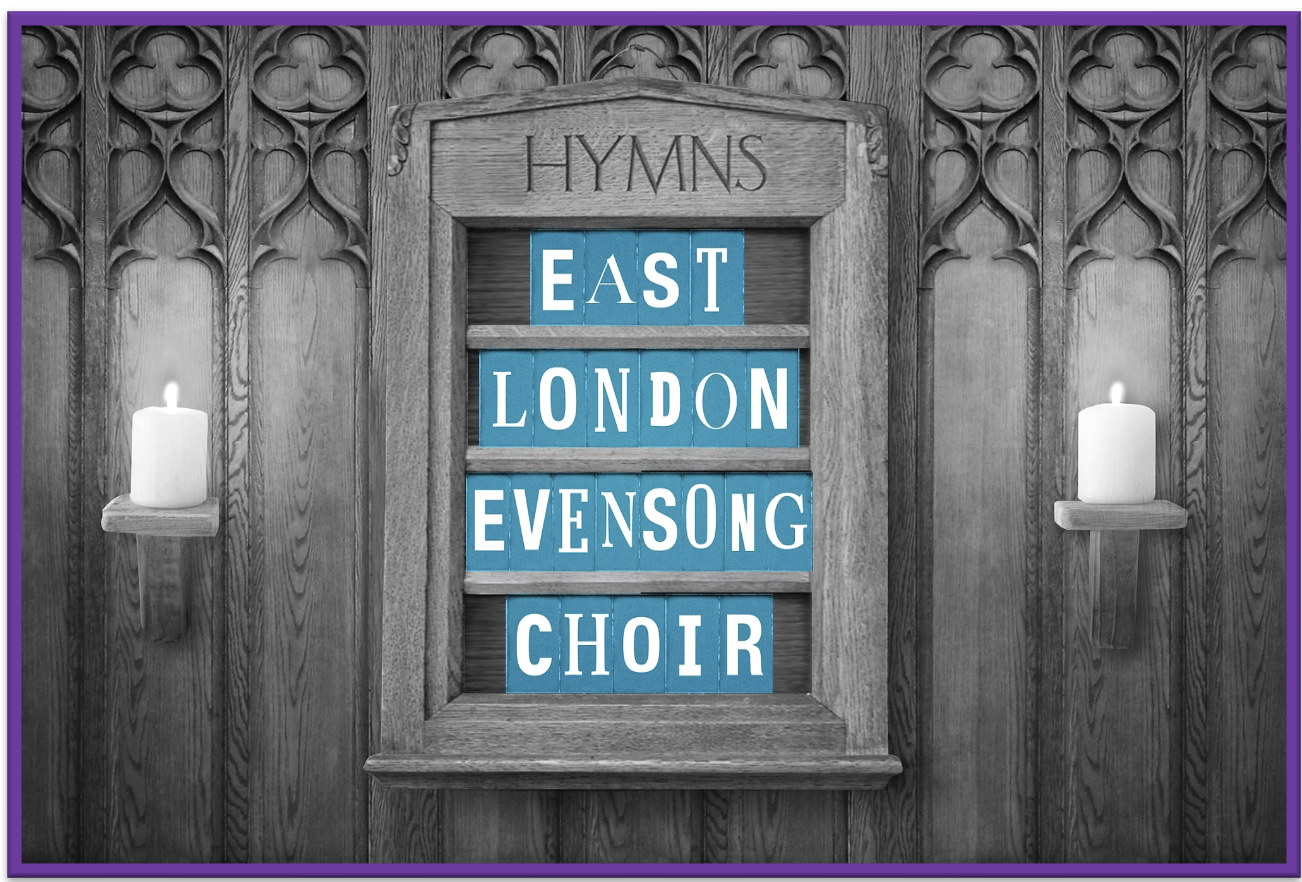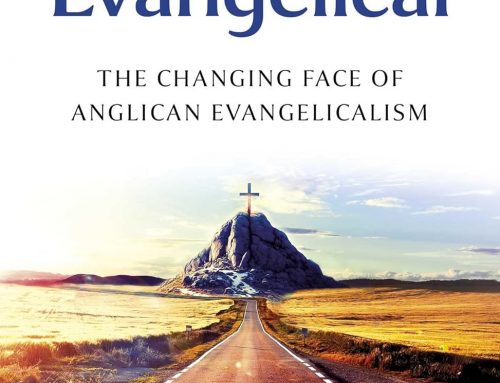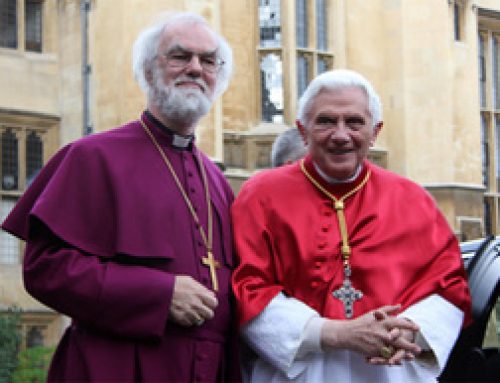No Tongues: what prayer ministry and a new colleague accidentally taught me about
the Book of Common Prayer
By Jonathan Pease

‘I can see a chapel from my window.’ Such was the standard response of the Cambridge undergraduate to being asked to declare one’s ‘religious views’ on Facebook. Some years later, from the 13th floor of a 1965 concrete apartment block on an east London A-road, I gaze down on an ex-seafarers’ chapel, set against a backdrop of ten-mile views out to where the golden evening brightens in the West. Now a thriving Charismatic operation, to which the flat I sit in belongs, this church entered a year ago into partnership with a liturgical church in the same Deanery, promising resource and revitalisation.
I was flattered to be asked to help with this: apparently a natural extension of my adventures to date with choirs, church music and liturgy in London’s East End. My two most recent sources of church employment had been pretty clear in their identities: prone, of course, to handbag fights over competing visions of Anglo-Catholicism, but rarely straying from their own paddock. Now I braced myself for re-exposure to the bewildering broadness of current Anglican churchmanship.
The invitation to write this article came with a proposed angle: making the Book of Common Prayer ‘relevant’ to the Badlands of inner-East London. The assumption that it wasn’t relevant already is a source of fascination to me, and one I enjoy countering, my arguments in its favour gently evolving and maturing with my own journey. My relationship with the BCP has been strengthened once again through the process of trying to articulate its value to a new Charismatic boss, and advocate for its place in our work. Selling tea to China has nothing on selling the Reformation to Evangelical Protestants.
A few months into this partnership, another new colleague cycled into view. The broadest of cheek-to-cheek grins almost functioned as a halo as an emerald Brompton glid into a cannister-filled churchyard at the junction of two A-roads. His churchmanship remains the most un-pin-down-able of anybody’s I have met in my life and, amid an energetic revitalisation of the church’s core liturgical offering, a new programme of extemporary prayer was soon established, informed and flavoured by his Nigerian heritage. Rarely in want of a reminder of life’s change and chance, I soon found myself perched at the back of these meetings, determined to show reciprocal open-mindedness to those who had barely flinched when I’d suggested making Choral Mattins a centrepiece of our children’s work.
There was a rush in the air: a sense that a latent spirituality that had always been whispered between the church’s sizeable Afro-Caribbean constituency now had a theatre; even a license. I confess to feeling deeply challenged, on two fronts. Firstly, I was exposed to a raw directness of prayer – loud, insistent, un-euphemistic – that at first seemed miles from anything I had encountered before. But I was equally challenged by the commitment and faithfulness that pervaded the meetings: belief that prayer was answered and an appetite for no-nonsense Christianity.
Try as I might, I couldn’t escape the conclusion that this unpasteurised, cri de coeur religion shared a spiritual undercurrent with the Book of Common Prayer. A sense that healing, deliverance and salvation were genuinely possible, particularly in response to physical sickness, and that constant, repeated petition to the Almighty could and would bear fruit. The conviction that exposition and exploration of scripture (read by preference from the Authorised Version) was a more-than-sufficient basis for a service. The no-frills, even domestic context suggested by the church basement in which we met. The exhortation – much to my amusement and friend’s distaste – to be a ‘church militant’.
I’ll resist for now the temptation to draw tortured parallels. I’ll acknowledge gladly that Cranmer’s micro-managerial, every-word-matters quest for liturgical unanimity is not adjacent in all respects to open-mic extemporary prayer. I certainly don’t venture to claim that anybody in that East End crypt was inspired by the BCP, or would even have been particularly grateful if presented with a copy. But something about these meetings catalysed an exploration of the ability of the Prayer Book, so often caricatured as lofty and exclusive, draws on the most spontaneous and universal of religious instincts.
On the First Sunday in Lent, the penny dropped. My colleague began a prayer meeting with a three-word phrase, at once blindingly obvious and deeply remarkable: ‘life is hard’. It was not an unreasonable observation in an area where the foes of crime, religious tension, social fracture and house uncertainty press hard on every side, and it clearly resonated.
And yet the phrase hit me like a bucket of cold water. Perhaps this is not a surprise in a Church of England whose response to a national medical and existential crisis was to dribble over microphone specifications; and whose desperate quest for mass appeal only seems to make it appear more middle-class. That same morning, we had prayed an earlier form of deliverance ministry, the 1544 Litany: and while privy sedition and the health of the Princess of Wales may not have been the chief preoccupations of every E14 resident that morning, life was clearly hard indeed for the population on whose behalf Cranmer raised up those desperate pleas. We roll our eyes with peril at fear of war, hunger, death, plague and persecution. We can turn our churches into places where these things are not mentioned. But who of sanity could claim that this increases their (what’s the word?) ‘relevance’ in today’s world?
A flawed modern determination to separate infinite varieties of worship style into ‘high’ and ‘low’ has caused us much confusion. Such a binary cannot process Evangelical churches that offer Holy Communion every week; Cathedrals that field robed choirs but cordon off their High Altars; country churches where 1662 Mattins is read daily but there isn’t a Priest. Exploring with Charismatics why chanted Coverdale Psalmody and a Roman Rite Mass might both be labelled ‘high’ but exist in opposition to one another has made me wonder whether we on the liturgical side of the fence understand sufficiently the variety of ‘low’ and ‘Evangelical’ styles.
My newfound basement haunt offered a realness; an uncompromising desire to confront difficulty that I had a lot of time for. By contrast, ‘life is hard’ was not the vibe I picked up from some of the slicker, Charismatic outfits I’ve had occasion to spy on. Endless murmurs of quasi-sensual gratitude; hands lifted in perpetual reception of infinite blessings; tears and genuflections of surrender induced just in time for coffee afterwards. It reads like a lot. But for me, it’s not enough, and it’s increased my appreciation for church that has a little more to say when the chips are down. Church able to embrace (hardly extra-Biblical) concepts like lament and despair; whose emotional register draws on the more-than-adequate peaks and troughs of the liturgical calendar, rather than the exhausting expectation of one’s own happiness.
On this last point, we might tut at the Charismatic movement for abandoning the calendar. But modern liturgical worship in the Anglican church has made itself the handmaiden of this with its judgement-free chocolate countdown Advent; its Epiphany divorced from the leprosy and suicidal swineherd of the BCP; its feel-good Lent replete with bespoke Mothering Sunday lectionary; its eye-rolling at hell and damnation; its commandment-free, de-Kyried Eucharistic liturgy; the infinite pub menu of Common Worship, desperate to find us something we might like, even if not good for us. We bypass difficulty, challenge and controversy in a ‘does my bum look big in this?’ effort not to repel newcomers. We try to divorce hardship and suffering from a God who spends an entire Old Testament picking people up at their darkest hours; whom many of us only trouble to seek at the point of distress, even surrender. Our worship becomes a middle-class exercise in insulating ourselves from inescapable and universal experiences of hardship – the spiritual equivalent of an after-work bottle of Pinot Grigio – rather than bringing ourselves to God through all the changing scenes of life.
It falls to us who care for the continued use of the BCP to invest in its everyman spirit. It astonishes me that anybody who claims affection for the blunt, even forbidding tautness of its prose, and its Baked Alaska of majesty and vulnerability, could continue to flog it as ‘poetic’ or (to quote the Church of England’s own website) ‘loved for the beauty of its language’. We risk making it a museum piece; a vintage port; an aesthetic enterprise; something we like because it’s old. A ‘thou’-fetishist’s exercise in choosing his own pronouns. Its short, stout pages feel tattered and torn at the moment, caught in a tug-of-war between culture warriors who embrace it as part of a wider attack on the modern age; and young, red-trousered cognoscenti seeking meaning in the messy and unpredictable world left to them by their stockbroker and politician fathers. They are of course welcome to the BCP, but they must take their place alongside all sorts and conditions of men.
My groping articulations of why the landscapes of east London visible from my lofty, loaned balcony seem so natural a fit for the Book of Common Prayer have been left more coherent by those basement meetings. A directness of expression. A no-nonsense faith that expects to be answered. A plea for stability in the thick of chaos. Hard-hitting stuff nestled beneath a superficial respectability. A blend of – perhaps a much-needed gateway between – the vernacular and the transcendental.
Jonathan Pease
Lent 2024
Jonathan is Director of Music at All Saints Poplar and leads the East London Evensong Choir, alongside two children’s liturgical choirs in Tower Hamlets.





